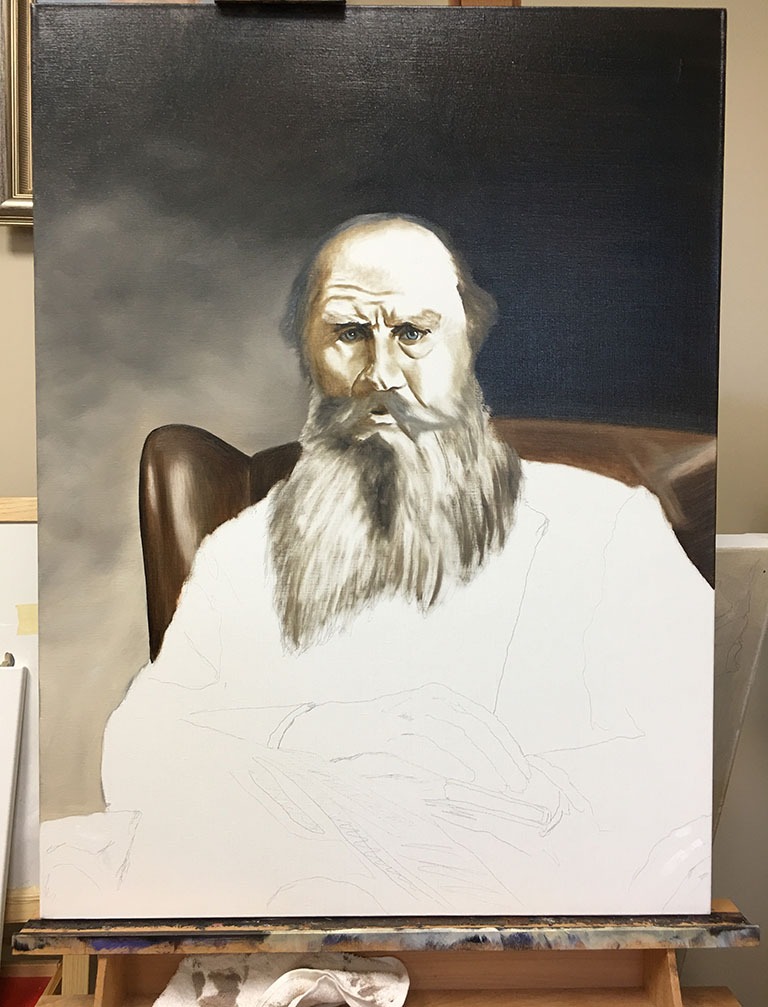Leo Tolstoy Archive
Written: 1899
Source: Anna Karenina, by Leo Tolstoy, translated from Russian to English by Constance Clara Garnett
Transcription/Markup: Andy Carloff
Online Source: RevoltLib.com; 2021

Nekhludoff was in this state of mind when he left the court-room and entered the jury-room. He sat near the window, listening to the conversations of his fellow jurymen, and smoked incessantly.
The cheerful merchant evidently sympathized with Merchant Smelkoff's manner of passing his time.
"Well, well! He went on his spree just like a Siberian! Seems to have known a good thing when he saw it. What a beauty!"
The foreman expressed the opinion that the whole case depended on the expert evidence. Peter Gerasimovich was jesting with the Jewish clerk, and both of them burst out laughing. Nekhludoff answered all questions in monosyllables, and only wished to be left in peace.
When the usher with the sidling gait called the jury into court Nekhludoff was seized with fear, as if judgment was to be passed on him, and not he to pass judgment on others.
In the depth of his soul he already felt that he was a rascal, who ought to be ashamed to look people in the face, and yet, by force of habit, he walked to the elevation with his customary air of self-confidence, and took his seat next to the foreman, crossed his legs and began to play with his pince-nez.
The prisoners, who had also been removed from the court, were brought in again.
The new faces of witnesses were now seen in the court-room, and Nekhludoff noticed Maslova constantly turning her head in the direction of a smartly attired, stout woman in silk and plush, with an elegant reticule hanging on her half-bare arm. This was, as Nekhludoff afterwards learned, Maslova's mistress and a witness against her.
The examination of the witnesses began as to their names, age, religion, et cetera. After being questioned as to whether they preferred to testify under oath, the same old priest, with difficulty moving his legs, came, and again arranging the gold cross on his silk-covered breast, with the same calmness and confidence, began to administer the oath to the witnesses and the expert. When the swearing in was over, the witnesses were removed to an adjoining room, leaving only Kitaeva, Maslova's mistress. She was asked what she knew of the affair. Kitaeva, with a feigned smile, a German accent, and straightening her hat at every sentence, fluently and circumstantially related the following:
Simon came first to her house for Liubasha.[E] In a little while Liubasha returned with the merchant. "The merchant was already in ecstasy," slightly smiling, said Kitaeva, "and he continued to drink and treat himself, but as he was short of money he sent to his room this same Liubasha, for whom he acquired a predilection," she said, looking at Maslova.
It seemed to Nekhludoff that Maslova smiled at this, and the smile seemed to him disgusting. A strange feeling of squeamishness mingled with compassion rose in his breast.
"What opinion did you entertain of Maslova?" timidly and blushingly asked the attorney assigned by the court to defend Maslova.
"Very excellent," answered Kitaeva. "The girl is very well educated and elegant in her manners. She was raised in a very good family, and could read French. She sometimes drank a little too much, but she never forgot herself. She is a very good girl."
Katiousha looked at her mistress, then suddenly turned her eyes on the jury and rested them on Nekhludoff, her face becoming serious and even stern. One of the stern eyes squinted. These strangely gazing eyes were turned on Nekhludoff for a considerable time. Notwithstanding the terror that seized him, he could not remove his own gaze from those squinting eyes with their shining whites. He recalled that awful night with the breaking ice, the fog, and especially that waning, upturned moon which rose in the morning and lit up something dark and terrible. These two black eyes which looked at and at the same time by him reminded him of something dark and terrible.
"She recognized me!" he thought. And Nekhludoff shrank, as it were, waiting for the blow. But she did not recognize him. She sighed calmly and again fixed her eyes on the justiciary. Nekhludoff also sighed. "Ah, if they would only hasten it through," he thought. He felt now as he did once when out game shooting, when he was obliged to kill a wounded bird—he was filled with disgust, pity and vexation. The wounded bird is struggling in the game bag; he feels disgust and pity, and wishes to kill it quickly and forget it.
Such mingled feelings filled Nekhludoff's breast as he sat listening to the examination of the witnesses.
[E] A contemptuous diminutive of Liuba. Tr.